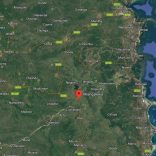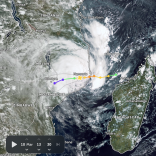Mozambique: Health department records new cases of cholera
Mozambique: Central regions warned to brace for second day of “intense heat”

FILE - For illustration purposes only [File photo: Lusa]
The Mozambican National Institute of Meteorology (INAM) has warned of a wave of “intense heat” that will affect three provinces in the centre of the country for the second day running today, with temperatures possibly reaching 41 degrees Celsius.
The alert issued by INAM, which follows another of the same kind issued on Wednesday for seven provinces in the centre and south, is valid until 4:00 p.m. (3:00 p.m. in Lisbon). It identifies seven districts in the centre of the country as “risk areas” for this Thursday, in the province of Sofala, eight in Manica and six in Tete, including the provincial capital city.
In this alert, INAM states that, due to the “persistence of the advection of hot and dry air towards the interior of Mozambique”, it predicts for today the “continuation of intense heat, with maximum temperatures ranging from 35 to 41 degrees Celsius” in the identified districts which are:
- Caia, Chibabava, Chemba, Inhaminga, Nhamatanda, Mafambisse and Marromeu, in Sofala province;
- Catandica, Dombe, Gondola, Guro, Macossa, Machaze, Manica and Sussundenga, in Manica province; and
- Chitima, Moatize, Mágoè, Mutarara, Zumbo and the city of Tete, in Tete province.
“Given the discomfort caused by the forecast weather, it is recommended that safety precautions be taken,” INAM stresses.
Mozambique is considered one of the countries most severely affected by climate change in the world, cyclically facing floods and tropical cyclones during the rainy season, which runs from October to April.
The 2018/2019 rainy season was one of the most severe in Mozambique’s history: 714 people died, including 648 victims of cyclones Idai and Kenneth, two of the worst ever to hit the country.
In the first quarter of last year, heavy rains and the passage of Cyclone Freddy caused 306 deaths, affected more than 1.3 million people in the country, and destroyed 236,000 homes and 3,200 classrooms, according to official government data.
At the end of September, President of Mozambique Filipe Nyusi called for the population and entities to be prepared for the foreseeable effects of the ‘El Niño’ phenomenon in the country in the following months, with forecasts of above-normal rainfall and outbreaks of drought.
“History repeats itself. So, we have to create conditions for resilience. In this sense, the government will issue regular warnings to keep the population informed and prepared for weather conditions that may not be favourable to life, production or infrastructure,” the head of state said.












Leave a Reply
Be the First to Comment!
You must be logged in to post a comment.
You must be logged in to post a comment.